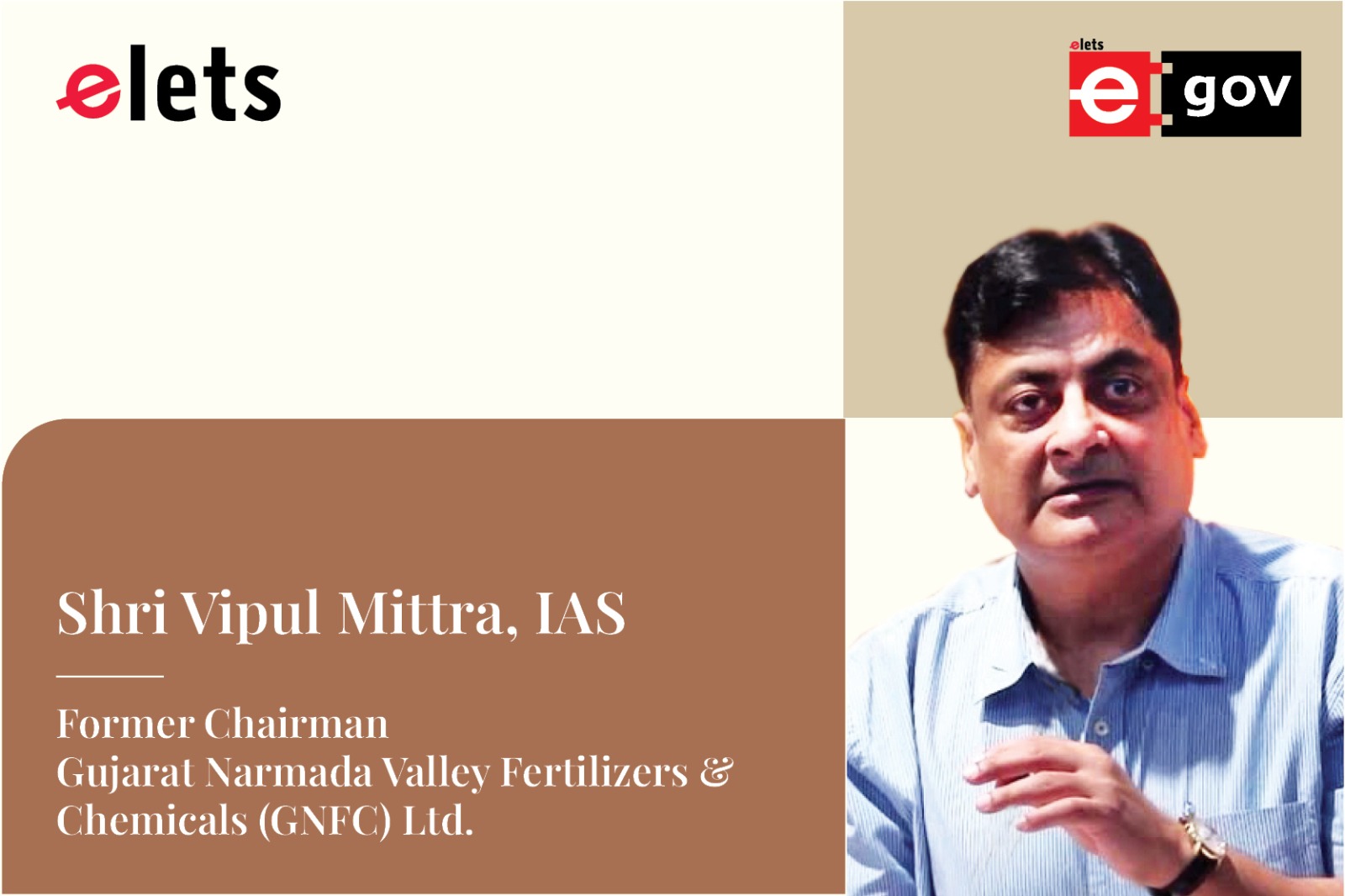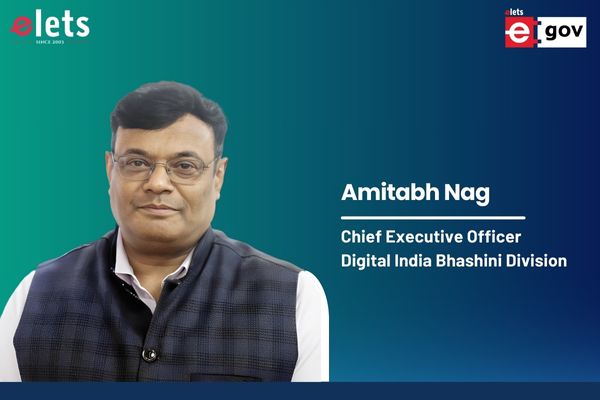
The key factors enabling Gujarat Narmada Valley Fertilizers & Chemicals (GNFC) Ltd. to sail through in these tough times are the highly integrated plants operating at full capacity and the strongly gripped and developed domestic market, shares Shri Vipul Mittra (IAS), Former Chairman, GNFC Ltd. in an exclusive interview with Hemangini S Rajput of Elets News Network (ENN). Edited Excerpts:
As the Chairman of GNFC, could you elaborate on the market dynamics and challenges faced by the fertilizer and chemical industry in the current landscape? How is GNFC addressing these challenges and maintaining its competitive position?
The Fertilizer & chemical sector in India faces major challenges such as high costs of basic raw materials like natural gas and crude oil, a lag in subsidy realisation, freight under-recoveries, energy consumption norms for Urea, low profitability, high trade credit, high cost of capital, the need for technological modernization of its facilities, supply chain disruptions, and cheaper imports. The current situation in the market is sluggish due to weak demand globally. India, being in better shape, is the favourable dumping ground for overseas suppliers, mainly China. Such being the situation, the Indian chemical industry is passing through a tough phase. However, GNFC is insulated because its products find their applications in various end-use sectors.

GNFC is the leading basic chemical manufacturer of Acetic Acid, Ethyl Acetate, Nitric Acid, Formic Acid, Aniline, Toluene Di-Isocyanate, Ammonium Nitrate, Methanol, Technical Grade Urea, etc., which are, in turn, basic building blocks for various application sectors like textiles, pharmaceuticals, paints, inks, rubber, leather, polyurethane foam, adhesives, explosives, laminates, diesel exhaust fluid, etc. The key factors enabling GNFC to sail through in these tough times are the highly integrated plants operating at full capacity and the strongly gripped and developed domestic market. It is the inherent strength of GNFC.

India aims to become the Food Bowl of the World by 2035. What is your vision in this regard and how can GNFC contribute in realising this vision?

India’s huge 1.4 billion population means its domestic food security concerns will override any ambition to become an agri-export powerhouse despite the country being the leading producer of several food items. It is the largest producer of milk and pulses, and the second-largest producer of rice, wheat, sugarcane, groundnut, vegetables, and fruits, according to the United Nations Food and Agriculture Organization (FAO).
India, with the help of technological advancements in agriculture like precision agriculture, mechanisation, developing high-yielding varieties, balanced fertilisation, and soil health maintenance, will definitely have the potential to become a ‘Food Bowl.’
According to research published by the consultant company Arthur D Little (ADL), ‘Investments in technologydriven innovations can lead India to catch up to its world peers. The 3Is, which comprise innovation, infrastructure, and investment, must be prioritised.’
GNFC, as an agri-input company, is working towards supplying quality products that help in higher productivity and soil health improvement. Besides, continuous advisory on newer and effective ways of agricultural practices is being disseminated to the farming community through different means.
In your opinion, what role does technology play in advancing agriculture and fertiliser practices in India? Can you provide some examples of how technology has positively impacted the sector?
Modern technology has had a significant impact on agriculture, revolutionising the industry and improving productivity, efficiency, and sustainability. Here are some key ways in which technology has influenced agriculture:
- Precision farming: Technologies such as GPS, remote sensing, and Geographic Information Systems (GIS) enable farmers to gather precise data about their fields. This data helps them optimise the use of fertilisers, water, and pesticides, leading to improved crop yields and reduced environmental impact.
- Automation: Agricultural machinery has increasingly adopted automation solutions, reducing the need for manual labour and improving efficiency. Tractors equipped with GPS systems can navigate fields accurately, and automated machinery can perform tasks like planting, harvesting, and sorting crops with precision and speed.
- Remote monitoring: Internet of Things (IoT) devices and sensors allow farmers to remotely monitor various aspects of their operations. They can track soil moisture levels, temperature, humidity, and crop growth patterns, helping them make informed decisions about irrigation, pest control, and crop management.
- Genetic engineering and biotechnology: Advances in biotechnology have led to the development of genetically modified (GM) crops with improved traits such as disease resistance, drought tolerance, and higher nutritional value. These crops offer increased yields and reduced pesticide usage.
- Data analytics solutions: The collection and analysis of large amounts of data from farm operations have become crucial in making informed decisions. Farmers can analyse data on weather patterns, crop performance, soil conditions, and market trends to optimise their farming practices, minimise risks, and maximise profits.
- Vertical farming and indoor agriculture: With the help of technology, indoor farming systems, such as hydroponics, aquaponics, and vertical farming, have gained popularity. These methods allow year-round cultivation in controlled environments, conserve water and land, and reduce transportation costs.
- Drones and satellite imagery: Drones equipped with high-resolution cameras and sensors can capture detailed images of fields. These images help identify crop health, detect pest and disease outbreaks, and assess irrigation needs. Satellite imagery provides a broader perspective, allowing farmers to monitor large areas and make data-driven decisions.
- Farm management software: Specialised software applications assist farmers in managing their operations efficiently. These tools enable them to plan and track activities, manage inventories, analyse financials, and streamline logistics, improving overall farm management.
Overall, modern technology has transformed agriculture, making it more productive, sustainable, and resilient. By leveraging these advancements, farmers can optimise their resources, reduce environmental impact, and meet the growing demand for food in a rapidly changing world.
Examples of recent developments include soil analysis equipment capable of providing the exact status of soil and applying precise inputs, micro-irrigation saving water and costs for farmers, monsoon forecasting aiding preparedness for weather conditions in advance, use of drones reducing dependence on farm labour, and initiatives like E-NAM generating opportunities for farmers to realise better prices for their produce.
Climate change poses significant challenges to the agricultural sector. What strategies or measures does GNFC employ to tackle the impact of climate change on agriculture and ensure long-term sustainability?
GNFC does a regular farm advisory and would keep providing ways to minimise impact of adverse climatic conditions, based on the ways and means being evolved/suggested by the stakeholders and scientists.
As sustainable agriculture gains prominence, how does GNFC support farmers in adopting environmentally friendly practices, such as organic farming and reduced chemical usage?
The company provides services for Soil & Water analysis and continually encourages farmers to plan their inputs based on the requirements derived from the analysis. GNFC also offers organic fertilisers such as city compost and has introduced Narmada Nano Urea to reduce the application of granulated urea, which pollutes the environment, soil, and water equally. Moreover, we have plans to venture into the marketing of Fermented Organic Manure, a byproduct of Compressed BioGas plants, to increase Organic Carbon in the soils.
Be a part of Elets Collaborative Initiatives. Join Us for Upcoming Events and explore business opportunities. Like us on Facebook , connect with us on LinkedIn and follow us on Twitter, Instagram.
"Exciting news! Elets technomedia is now on WhatsApp Channels Subscribe today by clicking the link and stay updated with the latest insights!" Click here!













